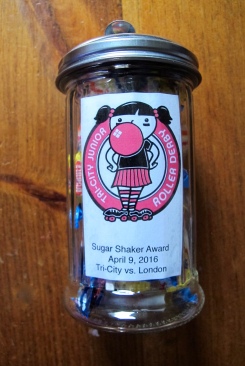Recently, our league held a juniors-only bootcamp coached by two members of Team Canada. Levelled 1, 2 and 3 skaters came from far and wide for this unique-to-our-area opportunity.
The skaters had a great time learning new things and meeting new friends. The coaches were warm and encouraging. And the kids were challenged; it was a bootcamp after all.
But there was an instance when one skater came off the track, visibly upset about something. Upon some discussion, it turned out this 13-year-old was emotionally shaken and bruised. It turned out that, after an hour of the bootcamp, the skater – who was the best on her team – was upset because she wasn’t the best overall.
It was a humbling exercise for her, no doubt. She had tested to level 3 in her league and, amidst the other level 3 skaters at the bootcamp, she was finding she couldn’t complete the drills properly and her skill set was letting her down.
With her mother, we talked with her about her choices for the day. She could either continue to feel miserable due to the emotions she added when she compared herself to others, or be open to the opportunity to learn something, even if it meant swallowing your pride a little. Even the Team Canada coaches must have had their ego bashed at some point in their derby life, right?
Look to others as an inspiration and look to yourself with belief and love and, yeah, humility. Embrace not just the stuff you’re great at, but also the things you have to work on…even if they seem so easy to others.
BEING special is relative but FEELING special is something everyone wants. At 13, this skater must be dealing with all sorts of grown-up thoughts she needs to sort through. As coaches, we must be very conscious of emotions and societal pressures in order to nurture the kids left in our care. Their time with you might be the brightest point of their day.

 Lately at practices, one of our skaters has been asking some seemingly odd questions.
Lately at practices, one of our skaters has been asking some seemingly odd questions.